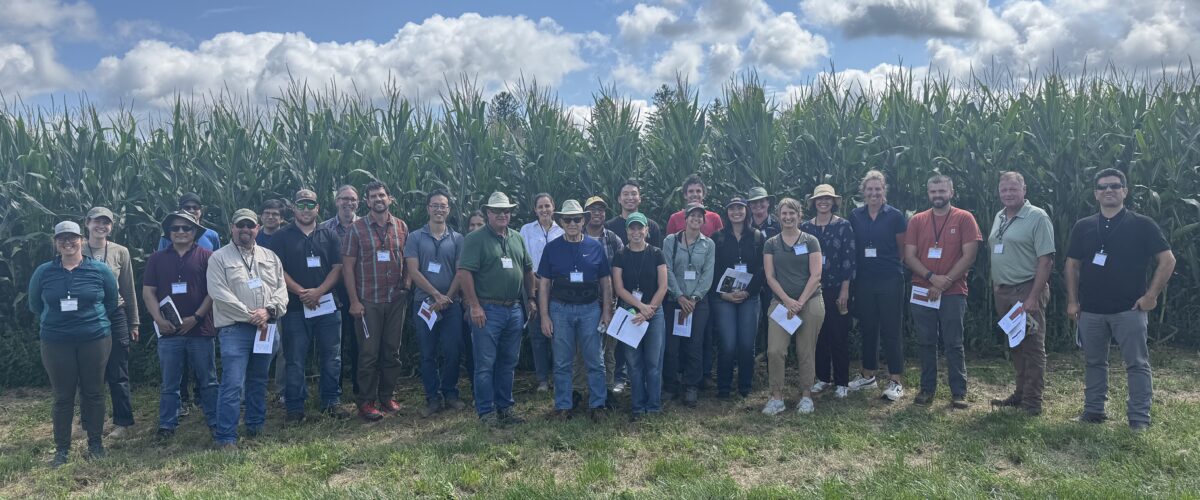
Updates, training, field visits make for robust DSWR annual all-team meeting
September 17, 2025
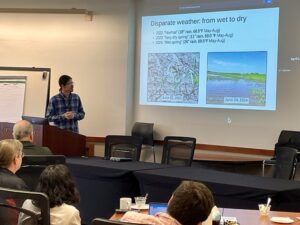 Researchers and leaders in the Dairy Soil & Water Regeneration (DSWR) project combined progress updates, training, a lab tour and visits to two field sites for a robust annual all-team gathering Aug. 19-21 in Wisconsin.
Researchers and leaders in the Dairy Soil & Water Regeneration (DSWR) project combined progress updates, training, a lab tour and visits to two field sites for a robust annual all-team gathering Aug. 19-21 in Wisconsin.
The eight-year project, now in its fifth year, is studying soil health and manure management and their effects on greenhouse gas reduction, water quality improvement and agronomic factors such as forage yield and quality. Field experiments are being conducted on commercial dairies, research farms and an almond farm in California, Idaho, New York, Texas, Vermont and Wisconsin.
Team members from across the U.S. delivered updates about the work at their individual sites, including findings to date, challenges and other key insights from the past year. The meeting was held at the University of Wisconsin-Madison, one of seven universities conducting DSWR research.
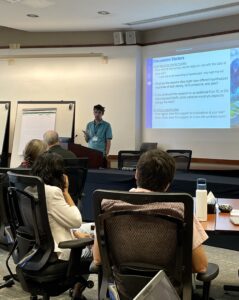 Sam Zipper, a consultant on the project, reviewed the results of a survey of nearly 400 experts to better understand the interaction between soil health management systems and hydrology. The goal is to help identify research priorities that could be addressed within DSWR and possibly future projects and, ultimately, guide management practices and investments in soil health.
Sam Zipper, a consultant on the project, reviewed the results of a survey of nearly 400 experts to better understand the interaction between soil health management systems and hydrology. The goal is to help identify research priorities that could be addressed within DSWR and possibly future projects and, ultimately, guide management practices and investments in soil health.
Small-group discussions at the meeting focused on outreach strategies including plans for publications and how best to utilize field days.
Corrine Brown from Newtrient, who is the DSWR communications lead, provided an update on the project’s communications efforts, from a quarterly e-update and annual progress update to news media outreach and video work, including dozens of clips featuring researchers along with an overview video that is in production. Looking ahead to 2026, Brown said communications will shift more toward research results and outreach events.
The group reviewed project messaging with Jamie Mara, a communications consultant, who also led a short workshop on best practices for participating in panel discussions. The training included a mock panel featuring four of the researchers.
Reza Afshar, vice president of soil, feed and water research at Dairy Management Inc. (DMI), which initiated DSWR, and Kathy Boomer, scientific program director at the Foundation for Food & Agriculture Research, a major supporter, reflected on the importance of the project and the significant progress that has been made.
Getting into the field in Arlington
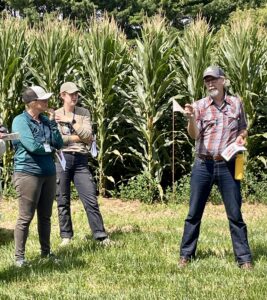
The field visits were held at UW-Madison’s Arlington Agricultural Research Station and the University of Wisconsin-Platteville’s Pioneer Farm, both in southern Wisconsin.
Research scientists Gregg Sanford and Adam von Haden led the visit to the Arlington site, where two studies are comparing soil health management systems and conventional systems in corn silage production. A two-year study also evaluated the nitrogen fertilizer replacement value of manure.
The teams also had an opportunity to take an informal tour of UW-Madison’s soils and agronomy buildings and lab.
Seeing trials in Platteville
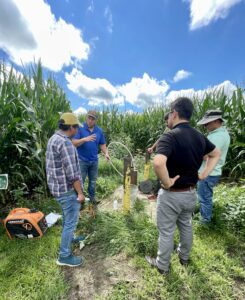
At the Platteville site, senior scientist Dennis Busch and research technicians Tristan Martins and Will Keast guided the group through fields where the team is analyzing soil health management systems and conventional field practices in corn silage for greenhouse gas emissions, soil health, crop yield and water quality outcomes. Participants also examined edge-of-field surface-water runoff monitoring stations.
The group also learned about robotic milkers from Cory Weigel, dairy enterprise manager at Pioneer Farm, who showed off two robots used at the farm.
In addition to UW-Madison and UW-Platteville, the other universities conducting DSWR research are Cornell University, Texas A&M AgriLife Research, University of California Agriculture and Natural Resources, University of California Davis and the University of Vermont. The U.S. Department of Agriculture Agricultural Research Service Northwest Irrigation and Soils Research in Kimberly, Idaho, is also participating. The Soil Health Institute collaborated with DMI on the project design and development, and the two organizations manage day-to-day project operations.
“UW-Madison’s hosting of the DSWR annual meeting created the perfect environment for advancing our mission-critical research on soil health and manure management,” Afshar said. “The integration of cutting-edge research updates with practical field demonstrations at Arlington and Platteville showcased exactly what makes this project so valuable — rigorous science that translates directly into sustainable practices for dairy farms nationwide.”